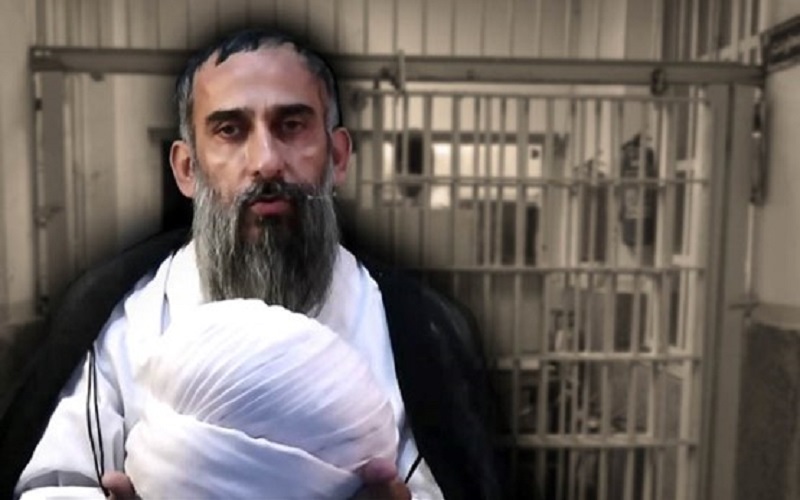
In an exclusive report on March 28, 2022, Iran Azadi [Freedom] website published a story on dissident cleric Einollah Rezazadeh Jouybari about horrific and flagrant crimes, torture, and ill-treatment of prisoners at Sari Prison in the northern province of Mazandaran.
“The past 40 years mark the darkest era in Iran’s history”
Einollah Rezazadeh Jouybari
Who Is Cleric Einollah Rezazadeh Jouybari?
Jouybari is a known opponent of the Velayat-e Faqih [the guardianship of the “Islamic” jurist] theory, who has been held in Sari Prison for years. In an open letter, he addressed the people of Iran, explaining the crimes committed by the religious dictatorship at this prison.
He also sent an audio file, blaming Judiciary Chief Gholam Hossein Mohseni-Eje’i for systematic violations of fundamental rights. “There is not a trace of human rights in your prisons,” he said.
Jouybari also made public the names of several prisoners who lost their lives due to torture and inhuman beating in Sari Prison. “No one has ever heard the name of these slain inmates,” he said.
Jouybari has been detained and imprisoned several times within the last decades. He posted a message two years ago, protesting human rights violations in Iran ruled under the mullahs.
He removed his turban and robe, saying, “I take off my turban and wear a hat to show I love Iran.” Authorities detained him following the message, and he is still being held in Sari Prison incommunicado.
Einollah Rezazadeh Jouybari’s Background
In 1990, authorities detained Jouybari for the first time, accusing him of opposing the Velayat-e Faqih principle. He was later be transferred to the Special Ward for the Clergy in Qom and spent some months there.
The regime also arrested Jouybari several times in 2002. Afterward, state-backed plainclothes abducted him in 2006, after he wrote a 200-page letter to Supreme Leader Ali Khamenei. He was imprisoned for one year.
In 2017, agents of the Ministry of Intelligence and Security (MOIS) again detained Jouybari. He was initially sentenced to eight years in prison and two years of internal exile. However, he was released a year later.
In 2019, on the 40th night of the bloody crackdown on peaceful protesters during the November uprising, authorities detained Jouybari, and he is still behind bars.
The Meaning of Justice in Iran’s Prisons
“Justice became a victim of political expediency. I spoke to lawyers who had remained silent regarding the Judiciary’s injustice and refusal to carry out the law. They remain silent, letting the cries of justice-seekers and freedom-loving people against such tyranny and injustice go in vain rather silencing the crooks,” Jouybari wrote.
Mohseni-Eje’i, Jurists, and Lawyers!
Jouybari wrote that the Judiciary Chief, the judges, and lawyers should be held accountable for such a degree of oppression and injustice. “The noble people of Iran and all justice-seekers ask, ‘Why do you not uphold your own laws?’” he added.
“You have repeatedly spoken about justice on the state-run TV and radio channels, and other media, praising civil rights and prisoners’ fundamental rights, promising to issue light sentences instead of imprisonment. However, you do nothing and refuse to implement your directives,” Jouybari said.
“Your prisons have been filled with elderly inmates who cannot afford the fines. Your judges and representatives refuse to release them under false and petty excuses.”
Inmates’ Dire Conditions in Iran’s Prisons
“Once upon a time, people accepted your words because they did not think a ‘preacher’ lies,” Jouybari added. “Do you know about prisons’ living conditions and facilities, particularly in Sari Prison? “Regrettably, many young prisoners and inmates have become sex slaves through drug addiction. They are consuming methadone, heroin, and other substances. Long queues of prisoners addicted to methadone speak about a human catastrophe,” Jouybari warned.
Suspicious Deaths in Iranian Prisons
“Mr. Eje’i, do you know about suspicious deaths and murders in prisons? What about the high number of suicides? What have you done in this respect?” Jouybari asked.
“The late Armin Mahdavi, 23, was in Sari Prison. [Thugs] beheaded him with a kitchen knife when he was asleep. The guards left 80-year-old Jan-Ali Ramezani naked in the corridors of ward two for four months. He suffered from infection, and he died.
“Mr. Eje’i, I hope you can explain the suspicious deaths of Qassem Shirzad, Jafar Azizi, Asgari Siahpush, Borhan Hakimian, Faramarz Ruhshenas, Omid Bipanah, Abbas Asghari, and many others who died because of officials took no action. God did not created humans for nothing; what should we call you, and how will history judge you?”
Undressing and Torturing Inmates in Iran’s Prisons
“Torturing, beating, insulting, and humiliating the prisoners are the tip of the iceberg,” Jouybari wrote. “Crucifying prisoners, submerging them in blackwater wells, undressing and inserting hot-water hoses into their bodies have become routine.”
“Even the Islamic State of Iraq and Syria (ISIS) and Al-Qaeda are ashamed of such crimes”
Einollah Rezazadeh Jouybari
“Dear compatriots, even one of these crimes against humanity was enough to topple a government in civilized countries,” wrote Jouybari. “Even the ‘Islamic’ State of Abubaker al-Baghdadi and the ‘Islamic’ State of Taliban refrained from practicing such shameful crimes and behavior against ordinary inmates and prisoners of war.”
“The past 40-years mark the bleakest and darkest era of our country’s history. Our glorious nation has been invaded multiple times by foreigners. However, no occupation or invasion has caused so much harm like these 40 years,” Jouybari continued.
Forty Years of Genocide Under the Theocracy in Iran
“In the past four decades, [the regime] committed genocide, ethnic cleansing, and religious apartheid. “In [the regime’s] prisons, there is nothing under the name of justice, civil rights, human rights, and humanitarian issues.”